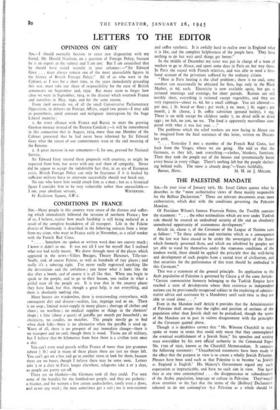CONDITIONS IN FRANCE
SIR,—Many people in this country were aware of the distress and suffer- ing which immediately followed the invasion of northern France ; few of us, I believe, realise how much hardship is still being endured' as a result of the complete breakdown of all transport. Life in the Falaise district of Normandy is described in the following extracts from a letter from my sister, who went to France early in November, as a relief worker with the French Red Cross.
" . . . . Somehow ihe spoken or written word does not convey much ; I know it didn't to me. It was not till I saw for myself that I realised what war had really meant. We drove through most of the places which appeared in the news—Villers Bocages, Theury Harcourt, Tilly-sur- Seulle, and, of course Falaise, as well as hundreds of tiny places ; and really it's a sobering sight. I've never really registered anything like the devastation and the awfulness ; you know what it looks like the day after a bomb, and of course it is all like that. When you begin to speak to the people, and to go to their houses, you realise in what a pitiful state all the people are. It is true that in the country places they have food, but that, though a great help, is not everything, and there is absolutely nothing else.
Many houses arc windowless, there is overcrowding everywhere, with consequent dirt and disease—scabies, lice, impetigo and so on. There is no soap ; limited water-supply in many places ; shortage of clothes and shoes ; no woollens ; no medical supplies or things in the chemists' shops ; s litre (about a quart) of paraffin per month per household ; no electricity, no candles, no matches. The people mostly go to bed when dusk falls—there is no alternative when the paraffin is used up. Worst of all, there is no prospect of any immediate change—there is no transport and no coal, though there is wood. Trains are all military, but I believe that 60 kilometres from here there is a civilian train once a day.
You can't even send parcels within France of more than 300 grammes (about lb.) and in many of these places there are just no shops left. You can't get on a bus and go to another town to look for them, because there are no buses, though I believe there may be some soon. Letters take 3 or 4 days to Paris, longer elsewhere, telegrams take 2 or 3 days, so people are pretty cut off.
There are no blankets—the Germans took all they could. I've seen some of the bundles, for the bombed-out people, and they are pathetic: a blanket, and for women a few cotton .underclothes, rarely even a dress, and never any wool ; the men sometimes get a suit ; tea is non-existent
and coffee synthetic. It is awfully hard to realise over in England what it is like, and the complete helplessness of the people here. They have nothing to do but wait until things get better."
In the middle of December my sister was put in charge of a team of workers to go to Alsace, and spent some days in Paris on her way there. In Paris she stayed with French relatives, and was able to send a first- hand account of the privations suffered by the ordinary citizen.
"Here in Paris heating is the chief problem ; there is no coal, some sawdust can occasionally be obtained for fires, logs only in the Black Market, at 6d. each. Electricity is now available again, but gas is rationed mornings and evenings, for short periods. Rations are still terribly short, everything is rationed except vegetables, and they are very expensive—about is. 6d. for a small cabbage. You are allowed:—
per day, lb. bread or flour ; per week, 3 oz. meat, lb. sugar ; per month, lb. cheese, j lb. coffee substitute (ground barley), I egg.
There is no milk except for children under 7, no dried milk or dried eggs ; no fish, no jam, no tea. The food is apparently marvellous com- pared with what it was last year. . ."
The problems which the relief workers are now facing in Alsace can be imagined from the final sentences of this letter, written on Decem- ber 20th.
". . . . Yesterday I met a member of the French Red Cross, just back from the Vosges, where we are going. She told us that the Germans, as they left, took everything :—clothes, 'blankets, furniture. Then they took the people out of the houses and systematically burnt every house in every village. There's nothing left but the people shelter- ing behind walls. The snow is already deep."—Yours faithfully,


























 Previous page
Previous page